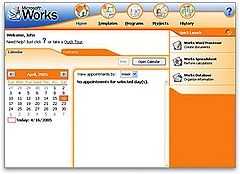There’s some renewed chatter about Microsoft’s plans for a subscription-based Office and even a free, ad-based alternative. Some rumors put the subscription price in the $12/ month range, which I believe is way too expensive for basic productivity tools, hence the need for another business model: offering MS Works for free, supported by advertising.
 MS Works is nowadays widely considered a “dumbed down” version of its big brother, the real MS Office suite, but I beg to disagree.
MS Works is nowadays widely considered a “dumbed down” version of its big brother, the real MS Office suite, but I beg to disagree.
Two decades ago MS Works was my main productivity suite: I was happily crunching numbers, generating charts, including them as well as data from my database in word-processing documents. In other words, I had a perfectly working and lightweight integrated office suite at the time when Word, Excel and Powerpoint were fragmented individual applications not talking to each other. For all its capabilities Works was very lightweight, I could use it on a laptop with 640K memory (that’s K, not MB!) and two 720k floppy drives – no hard-disk at all.
I can’t say this enough, Microsoft had a perfectly working integrated suite 20 years ago, which should have become what Office is today. But I guess you need bloatware to charge bloated prices, so Microsoft shoved Works aside, favoring the higher margin, high-end but fragmented products, which took years to become a true Office Suite.
The 80/20 rule applies for the MS Office Suite, in fact I’d rather say 90/10: 90% of users only need 10% of the functionality. MS Works has that – but now that it’s making a comeback (?), an ironic situation develops: the new online challengers like Google Docs and the Zoho Suite were targeting the mainstream Office Suite, and while in terms on features (needed or not) they are still behind Word, Excel..etc, the comparison to Works would quite possibly have a different outcome. I wouldn’t be surprised if Zoho Writer, Sheet and Show turned out to offer richer functionality than Works, and then we did not even look at the collaboration, mobility offered by the fact that they are Web-based.
Conclusion: MS Works should have been a winner 20 years ago, and ever since. Now it’s too little, too late.



Not only do I agree, I’ll take it a step further. Work is broken. A light has been shined on just how stagnant productivity software really has been and it’s upsetting that Microsoft has monopolized this category. That’s 20 years of our lives spent looking at the same analogy for doing work and it’s a big reason why most of us are trained to think in a file-centric mentality. SaaS or on premise software doesn’t get around that tired framework. It’s a blind, constipated way of collaborating and it’s quickly going away. Microsoft knows this. Office is being given away for free and it’s why they’re so focused on trying to evolve Sharepoint beyond a file-server right now.
People-centric flow is unbelievably refreshing and when people start working with it they quickly realize that they never want to go back to the “personal productivity” file world of Microsoft Office. For the first time in two decades, work can be fun again.
Oh, don’t get me started, been long wanting to rant on how obsolete the ‘file’ concept is, just didn’t find the time …
Zoli,
this story of Zoho, Google Docs vs. MS Office reminds me of an astonishing viewpoint described in the book of Clayton Christensen, titled The Innovator’s Dilemma.
The idea is about disruptive technologies, which regularly ruins established and mostly well-managed and surely succesful companies.
They do it with a quite different value proposition compared to the existing business model. The new technology lacks most of the features of the existing ones, but have one new feature – which the established market is NOT looking for.
But after gaining foot, the new technology is catching up with the “traditional” features, and it apparently reaches the bottom line of the mass market of the old products. That is the point of no return for the old players. They simply die out. Feature supply develops faster then feature demand. Incumbent players “overfeature” their products, new players need much less time than it is thought to be in the middle of the mass market.
Web-based office softwares seems to clearly fit this story.
What does all this mean?
a) MS did not make a strategic mistake managing its office products.
b) MS made a big mistake not to buy out Zoho, and immediately react to Google Doc somehow (how?)
c) this may mean the beginning of the end for MS op.systems as well I dare to say. Internet terminals with wifi, printer, some usb gadgets do not need Vista, even a Win95 has way too much funcions.
Ordinary users will need a boned op.sys. only, while companies would not need the many idiotic functions traditionaly populating MS op.systems.
ukridge